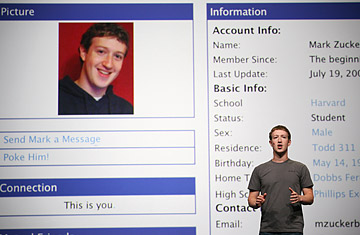
Facebook CEO Mark Zuckerberg delivers a keynote speech during the Facebook f8 developer conference at the San Francisco Design Center on Sept. 22, 2011
(2 of 2)
What's going to be fascinating is watching 800 million Facebook users come to terms with the service's changes. Will they use Open Graph apps to let it all hang out, or will they choose to ratchet up their privacy settings? How many people will give services permission to share everything on Facebook, and then rue it months or years later when something they don't want the world to know about is instantly distributed to all their pals? Do people really want to burrow back through their friends' Timelines, investigating what they were doing in 2007 or 2008?
As the new features roll out, some members are unquestionably going to be irate over them. Whenever Facebook changes, some folks are always irate, and Facebook changes more often than any other major online service. (To riff on what Mark Twain said about the weather in New England, if you don't like Facebook, just wait a few days.)
Even though using Facebook and turning on Open Graph are both optional — and it's still possible to share items selectively or not at all — Zuckerberg and company will be accused of violating users' privacy. In fact, it's already happening.
Me, I'm not so concerned about Open Graph's violating my privacy. (Useful rule of thumb: If you're doing something you want to keep secret, don't let it get anywhere near Facebook — heck, if possible, don't do it online, period.) I do, however, fret that Open Graph might make Facebook feel less personal rather than more so. The concept of Facebook logging my actions — most of them pretty mundane — in mass quantities sounds clinical, not heartwarming. Worst-case scenario, using the new Facebook could feel like living in a Skinner box.
I also like the Like button in its current form — by clicking it, our Facebook friends are editing their lives for us, calling out things that are interesting and ignoring things that aren't. As Farhad Manjoo points out at Slate, Facebook doesn't seem to want to restrict sharing to stuff that's compelling. Actually, a noisy minority of users are already up in arms over Ticker, another new feature, which scrolls through an infinite, uncurated list of your friends' updates, like Twitter on speed.
Speaking of Twitter, I worry more about the new features' potential influence on Facebook competitors than their impact on Facebook itself. I enjoy Twitter just the way it is — looser, sillier and more chaotic than Facebook. And I'm glad that Google+ still feels like it's populated by human beings rather than automatons issuing updates on behalf of humans. If either of these services reacts to Zuckerberg's grand new vision by mimicking it rather than counterpunching, it would be a shame.
I have my concerns, but overall, I'm hopeful that Facebook will get these new features right over time. I certainly don't think that it has fundamentally misjudged what its users want. The service gets into more mini-controversies than the average tech company. Unhappy campers threaten to abandon it more or less continuously, and it sometimes has to adjust its plans on the fly. Over and over, though, most users eventually come around to Zuck's way of thinking. By the time the next f8 conference rolls around, I suspect, it'll be tough to remember what Facebook — and life online — was like before Timeline and Open Graph existed.
McCracken blogs about personal technology at Technologizer, which he founded in 2008 after nearly two decades as a tech journalist; on Twitter, he's @harrymccracken. His column, also called Technologizer, appears every Thursday on TIME.com.
